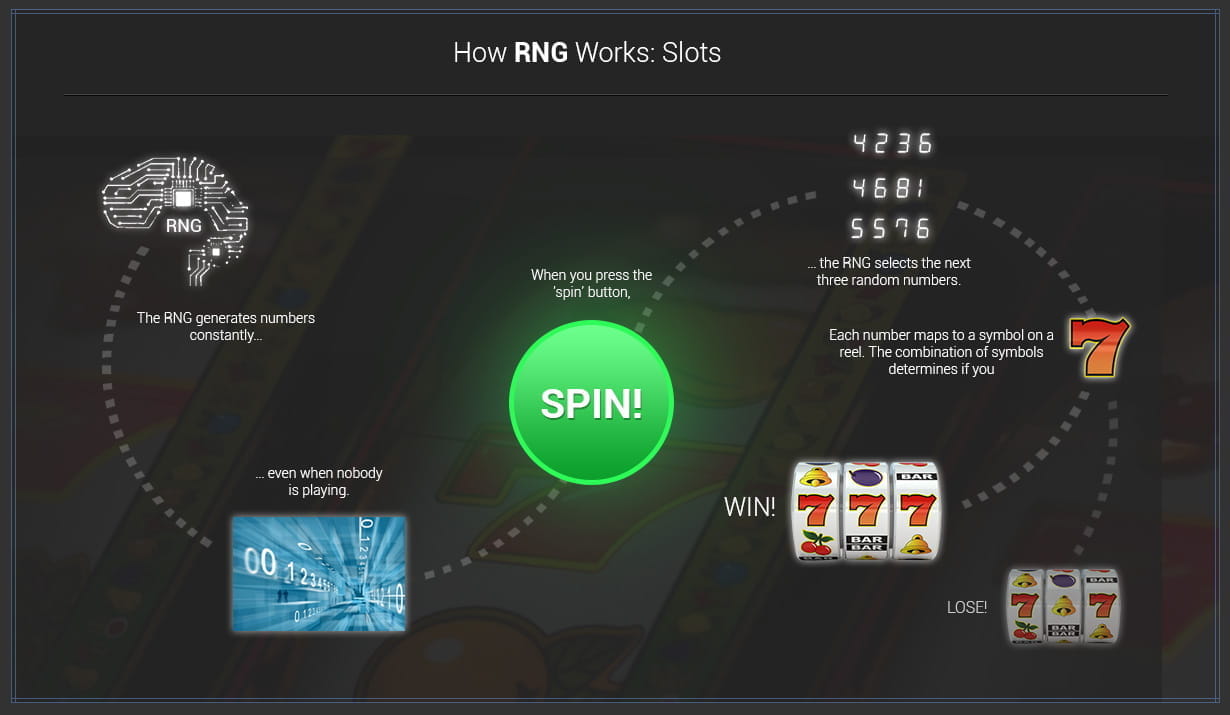The Random Number Generator
With the high demand for quality casino games, software developers are working hard on improving their offering constantly. They satiate the market with games that are more intuitive, boast breath-taking graphics, and can displace our boring reality with the push of a button. But one thing remains the same, despite all the fancy stuff on the outside. That’s the backbone of the game – the Random Number Generator (RNG). It generates thousands of numbers per second and is what’s behind the amazing graphics.
What Is an RNG?
 The random number generator is a computer program or a chip inside a machine that uses mathematical algorithms to generate a sequence of random numbers. The whole idea behind it is that it’s random. In casino games, randomness means fairness. However, people often wonder if the RNG is really random or if there’s some way for a casino to meddle with it. Better yet, if there is a way a player could manipulate it. That’s why we’ll take a closer look at how the RNG works, what types there are and how its randomness is tested.
The random number generator is a computer program or a chip inside a machine that uses mathematical algorithms to generate a sequence of random numbers. The whole idea behind it is that it’s random. In casino games, randomness means fairness. However, people often wonder if the RNG is really random or if there’s some way for a casino to meddle with it. Better yet, if there is a way a player could manipulate it. That’s why we’ll take a closer look at how the RNG works, what types there are and how its randomness is tested.
How Does It Work?
Imagine a computer program the only job of which is to spew out random numbers, one after the other. However, those numbers should not be linked in any way that could be recognised. That is, there shouldn’t be any pattern. Randomness happens in nature all the time but could a man-made program achieve it? Unfortunately, the answer is negative. No program designed by a human can be truly random and the reason for that is found in how the RNG programs work.
A programmer designs the RNG by instructing it to follow certain patterns. Here’s one example of a pattern. When the RNG is fed a random number (let’s say it’s 241) called a seed, the program should multiply it by itself (and get 58081), and then output the middle of the result (in this case 808) and use it as the next seed and repeat the algorithm. So, theoretically, if you know the seed and the algorithm, you can predict what numbers are coming up next. But don’t jump to the conclusion that you should go try to hack the RNG of your favourite online casino. Here’s the catch. There are two types of RNGs.
True Vs Pseudo Generators
What we have described in the previous paragraph refers to Software Generators, also known as Pseudo RNG. They need a seed and an algorithm in order to work, hence the term software. But there is another type – the Hardware Generators or the True RNG. With the latter, the machine doesn’t need a seed and the list of numbers generated is truly random. Now, even though the outcome of hardware RNGs cannot be predicted because there’s no seed and no algorithm, there’s still a small glitch.
We’ve already mentioned that randomness is common in nature. In other words, random processes in nature are nondeterministic – their next step is impossible to be determined, it’s unpredictable. Machines, on the other hand, are deterministic by nature – their next step is predictable and there’s a pattern over time. It might take a long period of time and a very fast computer but a pattern can be found, nonetheless. That, however, could not be used to the advantage of the players because it takes billions of instances to notice the pattern and then it will only be a general guideline. Even if you had the knowledge and the database to do that kind of experiment, it would not give you the next winning number at an RNG roulette, for example.
Slots – An Example of How RNG Works
An RNG works constantly, spitting random numbers all the time at an impressive speed. A good example of its work can be seen in slots. You stake your bet and press ‘spin’. The reels start spinning and you probably think that’s in a few seconds the outcome of the game will be determined. However, that very microsecond you’ve pressed ‘spin’ has taken the whatever number the RNG has come up with. So, whether you win or lose is decided the moment you stake your bet. If it’s a 3-reel slot, the pressing of the ‘spin’ button selects the next three random numbers. Each number maps to a symbol on each reel. The combination of the three means that you either win or lose.
 So, the picking of a number is truly random but why then do people hit the desired jackpot relatively rarely? Because every number that the RNG projects is linked to a certain symbol on the reel. It makes sense that more numbers would map to common symbols, while fewer numbers will link to the jackpot symbol. Besides, common symbols are a majority, whereas the most desired symbol is probably only one per reel.
So, the picking of a number is truly random but why then do people hit the desired jackpot relatively rarely? Because every number that the RNG projects is linked to a certain symbol on the reel. It makes sense that more numbers would map to common symbols, while fewer numbers will link to the jackpot symbol. Besides, common symbols are a majority, whereas the most desired symbol is probably only one per reel.
Fairness and Randomness
Casinos use a true RNG for their games to ensure that the games are random and fair. They do not do that only for the players’ sake – though that is an important reason – but to protect themselves as well. If casino offered even the slightest chance of having their upcoming numbers get predicted by someone playing the games, they’d go bankrupt in no time.
Is It Really Fair?
Any player has wondered at some point of their gaming experience whether the RNG used at the casino site is fair. If you’re playing at safe, reputable casinos, you shouldn’t worry about that. An RNG at a respectable casino is fair not only because they say so but because the operator is tested regularly for compliance with regulations. Yet, some players go so far as to claim that a casino or a game is rigged. To make things worse, there are, indeed, examples of dodgy sites that have used an RNG that’s not random. However, none of that could happen at the reputable casinos we recommend.
Can It Be Manipulated?
Once the players accept that the casino or a game is not rigged, they might start thinking of how they could get an advantage or a shortcut to a big win. The RNG is a machine, after all, so there must be a way of hacking it, right? Though that is a fact and there may be some who could possibly do it, it would take a long time and a lot of effort and expertise and the outcome isn’t even that clear. To put it briefly, a player shouldn’t waste time even thinking about the possibility because every RNG has gone through vigorous testing at the time of production and some more before being officially released. It’s no coincidence that the manufacturers of games are so successful. One of the reasons they are at the top of their game is that they don’t make games which someone could manipulate to give out more cash than they’re supposed to.
Official Testing
 To make sure the RNGs at online and land-based casinos continue to be completely fair and random, frequent tests are performed by accredited testing agencies. One of the most reputable ones is the pioneer in iGaming testing Technical Systems Testing (TST), which is part of Gaming Laboratories International (GLI). It offers a full range of testing services to land-based casinos and iGaming operators. TST performs live dealer and RNG evaluations and payout verification and reporting. It provides testing for the UK Gambling Commission and guarantees that all casinos in the UK licensed by the UKGC use a random and fair RNG.
To make sure the RNGs at online and land-based casinos continue to be completely fair and random, frequent tests are performed by accredited testing agencies. One of the most reputable ones is the pioneer in iGaming testing Technical Systems Testing (TST), which is part of Gaming Laboratories International (GLI). It offers a full range of testing services to land-based casinos and iGaming operators. TST performs live dealer and RNG evaluations and payout verification and reporting. It provides testing for the UK Gambling Commission and guarantees that all casinos in the UK licensed by the UKGC use a random and fair RNG.
The RNG Games – Safe and Approved
Despite urban legends of meddling with the RNG – no matter if we’re talking of casinos influencing the outcome of the generator or players who have hacked the program to get a better payout – RNGs used in casino games are completely safe, random, and fair. They go through strict testing procedures and are closely monitored and regulated by special testing agencies. That is, if you’re playing at regulated casinos that are 100% legal in the UK. If you play at an unregulated casino, there’s no guarantee that the RNG is random and the payouts fair. But with all the legal casinos available, there’s no excuse not to find one that suits your needs. Just make sure that somewhere on the website there’s the seal of the UK Gambling Commission and independent audit organisations, such as TST and eCOGRA.